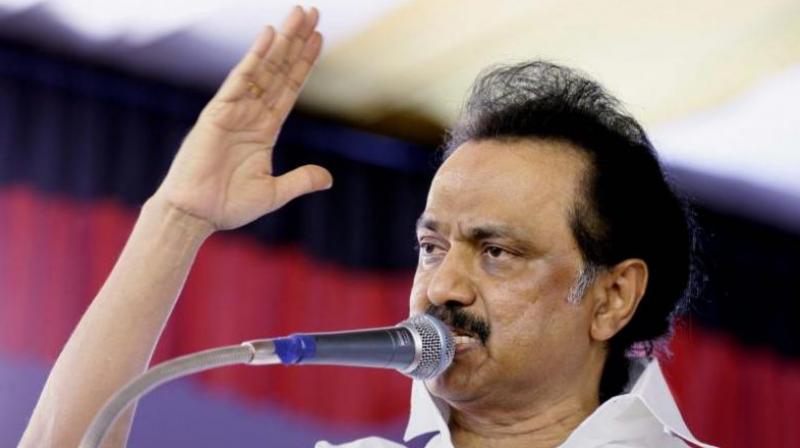Centre’s bid to bring back 3-language formula will be disastrous, warns Stalin
New Education Policy draft draws flak from Opposition parties.

Chennai: Denouncing the Kasturirangan committee’s draft new Education Policy, 2019,recommending implementation of a uniform three-language policy throughout the country that would entail teaching ‘Hindi’ from pre-school to Plus-2 level as “highly divisive and ahistorical”, the DMK president M K Stalin on Saturday warned the BJP-led Central government against any move to use the report as a ruse to “impose” Hindi on non-Hindi speaking states.
The Committee’s report is “truly shocking”, a dangerous bid to belittle other classical Indian languages like Tamil in the guise of ‘teaching Sanskrit the easy way’. It is a threat to national integration and a move that will again put people’s linguistic sentiments in non-Hindi speaking states “on the boil” decades after the linguistic re-organisation of States, Stalin said in a hard-hitting statement here and urged the BJP government to immediately reject the Kasturirangan panel report.
Mr. Stalin expressed serious concern at the implications of such a move for the Indian polity as a whole. In Tamil Nadu in particular, there have been several waves of the ‘anti-Hindi agitation’, from 1937-40, 1948-50, 1953-56, 1959-61 and 1963-65, to protest the imposition of Hindi, whenever it came to enforce a three-language formula and later under aegis of Official Languages Act, he pointed out.
Recalling that scores of people in Tamil Nadu, particularly the youth, had even sacrificed their lives in opposing ‘Hindi imposition’ in any form, Stalin said the cumulative impact of all these political movements right from the Madras Presidency days, finally under the first DMK Ministry led by C N Annadurai, led to the Tamil Nadu government officially adopting a ‘Two-language policy’- Tamil and English-.
When a resolution was adopted in January 1968 in the State Assembly, Stalin pointed out how the late lamented Anna had categorically said that “Tamil and Tamil alone” is one language that is best suited for being a pan-Indian lingua franca. Such was Anna’s commitment to Tamil that still rings in the ears of Tamil youth, the DMK leader said.
He also listed the names of anti-Hindi martyrs including Mayuram Sarangapani, Keezhapazhavur Chinnasamy, Kodambakkam Sivalangam and Virugambakkam Aranganathan among others, who died for the cause of Tamil and added the party observed January 25 every year as an occasion “to salute their memory”.
Mr. Stalin also drew attention to India’s first Prime Minister, Jawaharlal Nehru’s famous assurance in Parliament that English will continue to be the official link language for the entire country until the non-Hindi speaking states wanted it.
All these are a matter of historical record, the DMK leader said and wondered how either the BJP government or the Kasturirangan Committee set up by it could forget or ignore the historical evolution of this very sensitive language issue, particularly for the linguistic minorities in the country.
Expressing the hope that the BJP government by its actions would not unwittingly stoke another massive language agitation, Mr Stalin said several recommendations of the Kasturirangan committee including regular exchange of Hindi-speaking teachers to non-Hindi speaking states, introduction of books in the school syllabi to enable learning of Sanskrit “the easy way”, gave rise to the suspicion that it was an attempt to “compulsorily impose Hindi” on non-Hindispeaking people. This will pose a grave threat to India’s federal structure, he said.
Tamil Nadu had decided even 50 years back that there will not be teaching of Hindi in government schools, even as a subsequent DMK government under M Karunanidhi had enacted a law for mandatory learning of Tamil in all schools, even if they offered other languages. “How come all such historical facts been ignored by such an important high-powered committee,” asked Stalin.
Mr Stalin hoped that the Edappadi K Palaniswami-led AIADMK government will at once oppose the Kasturirangan panel’s report. Any bid by the BJP regime to even “dream in the margins” to push for an ambitious three-language formula in Tamil Nadu by targeting the “honeycomb of two-language policy,” could only be a “grave error courting unpredictable disasters”, Mr. Stalin warned, adding, DMK MPs will take up this issue in the very first session of the new Lok Sabha.
Meanwhile, in Tiruchy, DMK Rajya Sabha MP, Tiruchy Siva warned that the Centre’s move to make learning of Hindi compulsory in schools will meet with a severe backlash through another anti-Hindi stir in Tamil Nadu witnessed during 1964-65.

